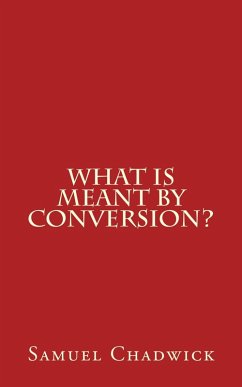Conversion needs to be defined; even Christians are not agreed as to what is meant by it. The significance attached to the term varies in the different schools of religious thought. With some, conversion is a comprehensive term which stands for the whole process of the soul's return to God. To be converted with them means to be saved; an experience that includes Repentance, Forgiveness, Regeneration, Assurance, and all the blessings of the state of grace. To others, conversion is the process of recovering from a condition of life in which the regenerating grace of Baptism has been neglected or lost. In this case conversion is the recognition of all that is implied in baptism, and a yielding to its operating power. In the one case, man needs to be converted that he may enter the kingdom; in the other, he is in the kingdom, but needs to be converted if he has been a wanderer from the flock. To the Christian who seeks to bring his religion into harmony with the peculiarities of modern thought, and to state it in the terms of modern science, conversion is somewhat of a difficulty. Like the doctrine of the Fall, it does not fit in easily with the general scheme of evolution. He seeks a salvation which is an orderly unfolding of man, and the doctrine of salvation by education has no place for anything so revolutionary as conversion. With the first, conversion is everything, necessary for all, and essential to all experience of the grace of God. With the second, it is almost incidental, and necessary only to those who have despised the grace received in baptism. To the third, conversion is a term which should be substituted by development, education, and the culture of the soul. The use of the one term in so many varying shades of meaning, and differences of content and value, is apt to lead to misunderstanding. The word itself means simply to turn about from anything to its opposite. This is its ordinary meaning in common life. When a politician changes sides he is said to have been converted. He leaves the party with which he has been identified, crosses the floor of the House, and allies himself with the party he has hitherto opposed. Its meaning is exactly the same when applied to religion. The Revised Version in nearly every instance renders the word 'turn'; the word 'convert' has therefore almost entirely disappeared from the Scriptures. Conversion means nothing more than the act of turning to God; the crisis in which man turns from a course of godlessness and begins to seek the Lord.
Dieser Download kann aus rechtlichen Gründen nur mit Rechnungsadresse in A, B, BG, CY, CZ, D, DK, EW, E, FIN, F, GR, H, IRL, I, LT, L, LR, M, NL, PL, P, R, S, SLO, SK ausgeliefert werden.









